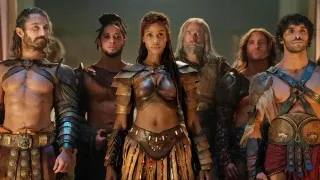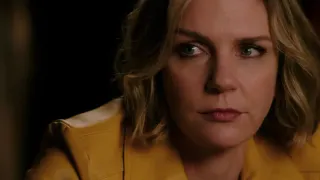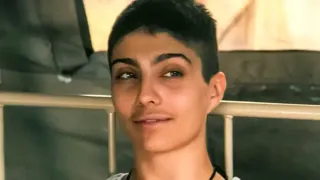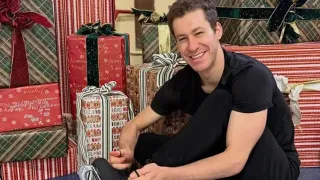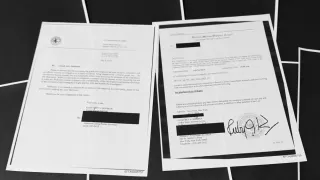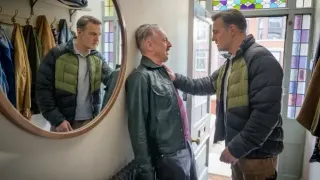October 16, 2024
EDGE Interview: Queer Canadian Pop Star Minoe Brings Fire Island Party to the Village
Nicholas Dussault READ TIME: 13 MIN.
EDGE: Let's talk about your songs. "Liquorlips," did you really meet the woman you wrote it with (Renon) on the street?
Minoe: Oh, shit, that's amazing. It's been a while, so I think I can say no. We actually met at a charity event where we were both performing. I saw her show and I loved her lyrics, and she loved my lyrics. The first time we ever really just hung out we made "Liquorlips," so that's true. It was so fun. We have the same references. We really hit it off. It was pretty easy.
EDGE: Amazing lyrics.
Minoe: Thank you. What's your favorite?
EDGE: "Dripping down your face, body next to me, eating me up. Lick the plate. Yep, love me like the bitch you hate." That's my favorite.
Minoe: Thank you!
EDGE: Do you, as most artists do, draw on your personal experience to create your music? If so, is there a story behind "Wish I Killed My Ex-boyfriend?"
Minoe: There's an interesting story behind that one. It's a little deep, but it's also a little funny. Basically, I dated this guy who was awful. After we broke up, it came out that he had a lot of sexual assault allegations against him, and, based on my experience with him, I believed them. The night that I found out, I had a dream where I was choking him and I stopped myself because I thought, "Oh my God, I'm not a murderer." Then I woke up and thought, "Damn, I should have killed him. It was just a dream. Just go for it, girl." Funny enough, that song was made with my current partner of four years now. He's a producer, and it was at the very beginning of us being together. I was a bit concerned that he was going to think I was insane, but he was vibing with it, adding gunshot sound effects. He's crazy, too.
EDGE: So let's get to New York. You're coming to the Duplex. What is "Sultry Shores, The Fire Island Cabaret?"
Minoe: It's a late-night cirque cabaret, and it's starring me. I'm emceeing. It's based around my music, my catalog, so I've written all the songs that are in the show. It features these incredible circus performers, burlesque performers, magicians, comedians. It's sort of a variety show.
EDGE: It sounds a bit like "Pippin" meets "Cabaret"
Minoe: We have an acrobat from "Pippin," so there you go. It's also kind of mermaidy, because it's a pool party. We're going in a mermaidy, sparkly direction. It's going to be really, really fun. I'm excited to even just see the acrobatics to my music. I'm sure it's going to totally blow my mind. There are stories that play out on stage through the performances. The main thing is that it's a Fire Island pool party with an annoying lifeguard who's trying to shut it down, and me, the fun party girl who's trying to keep it going. It's gonna be fun.
EDGE: So, how did this all come about?
Minoe: They found me in PinkNews, where I was named a top queer artist to watch in 2024. I am a queer person, you know – shocker, alert the media,
EDGE: And your partner is male.
Minoe: My partner is male. I'm pansexual. I like the wine, not the label, I guess. I don't care about gender. I care about the person, and my partner is the sweetest, loveliest person. And if he was in a female body, if he was gender non-conforming, that just wouldn't matter to me.
EDGE: And that's how you define queer?
Minoe: Queer is just an umbrella term to me. Honestly, sometimes I say queer because people don't know what pansexual is, so I just kind of avoid it. It also kind of depends on the environment that I'm in. If I'm around a lot of straight people, I'll just say I'm queer and let them kind of do puzzles in their head, I guess. But if I'm around a bunch of queer people, I'll say I'm pansexual because I feel maybe a little safer.
EDGE: That's helpful to hear. When I was growing up, queer was a word you never wanted to be called. It can still sometimes be triggering.
Minoe: That's so interesting. I hope maybe people can take some solace in knowing that it's really been kind of rebranded as this almost safe word to kind of not have you dissect your sexuality to somebody, but to let them know that you're part of the community. It's so not an insult now. I'm happy to be having this conversation.
The show is full of queer people. See, that makes it easy, right? Because if I say queer, then I don't have to say gay and lesbian and pansexual and bisexual and all of those things. Back to the show, it's cirque burlesque. When I was initially approached about it, they said, "boylesk," which I loved. That's a fun term. There's an acrobat, an international circus star, a magician, a bunch of amazing people.
EDGE: Sounds like there's a lot of action on Sultry Shores.
Minoe: I hope I represented the show well. I'm really excited to do it. It's my first time in New York City, my first time in the States at all.
EDGE: Really? You're going to love New York. You won't want to leave.
Minoe: We'll see. I've never been, and actually I've had some fans reach out to me from the U.S. saying that they love me and they're so annoyed that I'm never there because I'm in Canada. I'm coming to you now.
EDGE: One more question. If you could go back to your younger self, what would you say to them?
Minoe: That's a big one. I grew up in a very volatile and difficult environment. When I moved away it was partially to follow my dreams, but also partially for my safety. I think it's important, through what I'm doing now, to reach out to those kids that aren't safe at home, because I feel like there's not a whole lot of advocates for those people. If I could talk to her, I would tell her that she's going to be happy and she's going to have really cool things happen to her. Even just knowing that when I was younger would have been awesome. I hope that other young kids that are in similar thing know that things will happen when you're not there anymore. It's not going to be like that forever.
For information about "Sultry Shores" and other events at Ferry's Landing, visit the Ferry's Landing website.
For more information about Minoe, visit her Facebook page.
